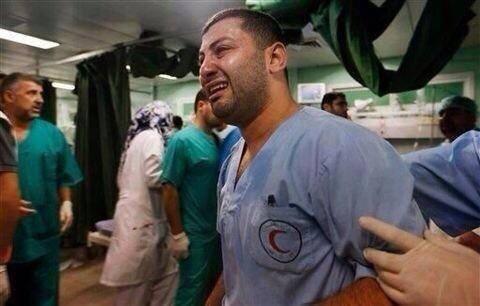Gilles Pelissier, MSF Gaza project coordinator, is responsible for the security of MSF teams in Gaza. Yesterday he was waiting for the announcement of a new ceasefire while following the information on the negotiations which were taking place in Cairo between Israelis and Palestinians.
We were awaiting confirmation of the ceasefire agreement. There had just been three or four missile strikes on Gaza City, but people in the local neighborhood thought that it was ok. Then we heard a massive explosion. There had been a huge strike 100 metres behind Al Shifa hospital. It took me by surprise because it is rare for a missile to strike so close by; it was a powerful explosion. Immediately I told the MSF team to get into our “Safe room ". The “safe room” is a room located in the centre of the ground floor of the MSF compound where we live and work. Our compound is a five minute drive from Al Shifa Hospital, the largest hospital in the Gaza Strip.
Safe room
The safe room has thick walls and is well protected against shrapnel, but obviously cannot withstand direct bombing . The safe room is easily accessible for anyone working on the ground floor or staying in the first floor bedrooms and all MSF staff know they must go there directly in an emergency. This time, we did not have to stay in the safe room for very long. A new 72-hour ceasefire was confirmed by Palestinians, then by Israelis. But the fighting continued between 8pm, when the ceasefire was announced, and when it came into effect at midnight. This intense fighting before a ceasefire is typical. I’ve observed that the bombardments are particularly heavy just before a ceasefire comes into effect and once it ends. When the second 72 hour ceasefire ended at 8am, the hostilities resumed immediately. The first truce lasted just eight minutes rather than the 72 hours that had been announced. There is no respite.
Toxic fumes
The nearby explosion hit a factory producing cleaning products and detergents, which was located behind the hospital. Firefighters had inhaled toxic fumes but we didn’t receive any wounded patients in the hospital, which was relatively quiet compared to recent days. The MSF surgical team was busy doing recovery operations.
Calm has returned
It was the same for our other MSF team working at Nasser Hospital in Khan Younis located in the southern Gaza Strip. Miyuki, a Japanese surgeon and Kelly, an Australian anesthesiologist, did not have patients needing urgent surgery. The bombing was too far away to hear and the area was relatively quiet that night. But I advised them to be on their guard until the ceasefire actually came into effect. Kelly, Miyuki and their Palestinian interpreter spent a second night at Nasser hospital because we were able to find a small office near the operating theatre that could function as a bedroom at night and an office during the daytime. As long as there was no ceasefire it was too dangerous to make the 45 minute road journey back to Gaza city. But today, calm has returned with the ceasefire and they are able to return.



